
Transcription
https://mississippitoday.org/2019/05/29/leaked-mississippi-prison-photos-of-skimpy-meals-moldy-showers-and-exposed-wiring-prompts-call-for-investigation/
JUSTICE
Leaked Mississippi prison photos of skimpy meals, moldy showers and exposed wiring prompt call for investigation
BY MICHELLE LIU | MAY 29, 2019
A national criminal justice reform group wants a federal investigation into Mississippi State Penitentiary at Parchman.
In a letter to the Department of Justice’s Civil Rights Division last week, Families Against Mandatory Minimums cited evidence of what they called unsafe conditions, including violence and the presence of weapons, as well as understaffing at the state’s second-largest prison. These claims were based on letters and photographs prisoners sent the organization.
Kelvin Sanders
Kelvin Sanders, a former inmate at Parchman Prison in Sunflower County, said this photo shows men sleeping on the floor of the prison to avoid water dripping down on their beds.
“We’ve heard about Parchman over the years,” FAMM President Kevin Ring said in an interview. “But it’s only been in the last few weeks that we started to get more clips, videos and messages from people inside.”
“To see inside a cell, the water damage, the black mold, the flooding — it just seems like there’s something going on here,” Ring said.
Ring compared the conditions of the Sunflower County facility, which houses over 3,000 prisoners from across the state, to those of Alabama prisons deemed unconstitutional in a DOJ report last month.
FAMM also decried the effect of frequent lockdowns, in which many routine prison functions such as commissary and in-person visits are cancelled, on prisoners’ family members.
The Mississippi Department of Corrections did not immediately respond to a request for comment.
The call for action follows a sudden influx of photographs and videos purportedly leaked from Parchman and South Mississippi Correctional Institution in Leakesville that circulated across social media in the last week.
Those images depict showers with peeling walls and stained floors; sparse food trays; emaciated men slumped over their bunks and lying on mattresses on the floor.
Two separate people, who identified themselves as a former prisoner and the fiancee of a current inmate, came forward as the sources of the photographs and videos, which were first posted to a Facebook group advocating for prison reform earlier this month.
Many of the photographs depict Parchman, according to a man named Kelvin Sanders, who posted dozens of photos on Facebook. He also shared videos depicting two men fighting among bunks with Mississippi Today.
The Mississippi Department of Corrections could substantiate neither the photos nor the video, according to a spokesperson.
“It’s hard to forget,” said Sanders of his time at Parchman. He provided a photograph of an MDOC inmate identification card issued in 2017 bearing his name. Sanders managed to hold onto an SD card containing the photos he took with a contraband cell phone from 2016 through the completion his sentence in January of this year, he said.
Kelvin Sanders
Former Parchman prisoner Kelvin Sanders says he has taken many photos of living conditions at the prison on a contraband cell phone. He later took the phone’s memory card with him, he said, and posted the images, including this one which shows exposed wiring, to Facebook.
Sanders said in an interview that after he posted the photos online, he received a call from an unlisted number. The caller identified themselves as an MDOC employee and threatened Sanders with retaliation, though Sanders said he was not afraid because he completed his sentence in January and is not under community supervision. He has since moved to out of Mississippi.
An agency spokesperson confirmed that a man by Sanders’s name was in MDOC custody, including at Parchman, on and off between March 1997 and January 2019, but could not verify Sanders’s allegation about any threats made.
Lakeshia Payton, whose fiance is currently at SMCI, also made public several photos and video which she said depicted South Mississippi Correctional Institution in Greene County this month. Payton said she cried upon receiving the media from someone else at the facility.
Listen to the Latest Episode of our Podcast
THE OTHER SIDE PODCAST
The images, which Payton also provided to Mississippi Today, include videos that pan over a shower and show what appears to be mold on the walls.
“I couldn’t even look at that,” she said of the videos. “I had those videos for months.” Fed up with a months-long lockdown at SMCI, she finally put them online, Payton said.
The photos and video were publicized by Carol Leonard, a Tennessee-based advocate for prisoners and their families, through her social media channels.
Video Player
00:00
00:55
“The guys take a huge risk in leaking this stuff,” Leonard said in an interview.
Penalties for possessing a cell phone or other contraband in a correctional facility are stiff. A conviction can lead to a prison sentence of three to 15 years and a fine of up to $25,000.
For advocates such as Leonard, the photographs and video confirm the living and social conditions many on the outside have long heard about, from black mold in dirty showers to a lack of programming available for prisoners.
Earlier this year, over 2,000 photos depicting scenes of violence and gore in Alabama’s St. Clair Correctional Facility, one of the prisons cited in the DOJ report, were leaked to news media.
Mississippi itself is currently battling a lawsuit over conditions inside the privately run East Mississippi Correctional Facility near Meridian.
ABOUT MICHELLE LIU
Michelle Liu
Michelle Liu, a Texas native, is a 2018 corps member for Report for America, a national service program that places talented journalists in local newsrooms. She has covered criminal justice issues across the state since joining our team June 2018. Her work has appeared in the New Haven Independent.
===
https://www.themarshallproject.org/2019/06/26/corporate-confession-gangs-ran-this-private-prison
Corporate Confession: Gangs Ran This Private Prison
What happened in Mississippi when no one wanted dangerous, low-paying guard jobs.
By JOSEPH NEFF and ALYSIA SANTO
Motion graphics by TOM MCCARTEN
It was a prison brimming with violence, awash in weapons—and severely short on guards to patrol its cell blocks. But security-camera footage caught the action when Brad Fitch arrived in unit F at Mississippi’s Wilkinson County Correctional Facility on Jan. 31, 2018.This story is published in collaboration with the USA TODAY Network, Jackson Clarion-Ledger and the Mississippi Center for Investigative Reporting.
The two sets of sneakers, pacing outside the cell he had occupied for six hours. His race through the dayroom, his white t-shirt soaked in blood. His desperate run for the locked exit, chased by two prisoners. The slash of a handmade knife—a shank—as he stumbled.
The rain of blows that left him curled up on the floor of a shower stall in a pool of his own blood, 10 stab wounds in his back.
His attackers, after performing what investigators later concluded was a gang-ordered hit, walked calmly away. Even when a handful of guards turned up and found Fitch, inmates continued to mill around, heating up snacks in a microwave just yards from where he lay.
Such a nonchalant display of gang power wasn’t unusual at Wilkinson, a 950-bed maximum security prison where there have been at least four gang-related homicides in the last two years.
In fact, the warden relied on gangs to keep the peace.
Like most prisons in Mississippi and a growing number across the country, Wilkinson had trouble finding people willing to take dangerous, low-paying guard jobs (more than a third were vacant, and annual turnover was close to 90 percent).
Jody Bradley, the warden, had turned to gang leaders to keep the inmates under control. His explanation of this situation is contained in a confidential “critical self-analysis” on the prison that was obtained by The Marshall Project. The internal audit was produced last December for Management & Training Corporation, or MTC, the private company Mississippi pays to manage Wilkinson. The prison is located in the tiny town of Woodville near the Louisiana border.
MTC hired an outside consultant to identify risks to running the prison “in a safe and secure manner, to identify best practices and innovations, and to provide technical assistance, guidance and training,” according to the audit. The company says it does comprehensive audits every two years.
Since the report, the company has hired a new warden and says it has made other improvements, including increasing pay for guards. It recently advertised a correctional-officer job at Wilkinson paying $11.25 an hour; the minimum wage in Mississippi is $7.25 an hour.
Wilkinson is challenging to run, according to Sara Revell, a regional vice-president at MTC. Seven hundred of the more than 900 inmates are in maximum security; 80 percent are affiliated with gangs.
To say gangs “are in charge of, running or are in control of Wilkinson County Correctional Facility, I don’t believe is accurate at all,” Revell said in an interview. “Good things are happening at Wilkinson and will continue to improve.”
Bradley, the former warden, declined to comment.
With unemployment low, prisons across the country are struggling to hire and retain guards; these jobs, despite being high risk, often pay less than that of an hourly retail worker. Staffing shortages have been blamed for violent incidents in state prisons across the country, and without enough guards, prison systems often lockdown inmates, restricting them to their cells for weeks or even months.
Bradley’s response to this problem, according to the audit: “he speaks with the gang lords/leaders and asks them to ‘control their men.’ If they do not control the individuals on the unit, the Warden will place the unit on lockdown,” which means prisoners are confined to their cells with no visits, no recreation, no meals in the cafeteria.
Using gangs this way is just how Mississippi prisons operate, the warden said: “It ain’t right, but it’s the truth.” He told auditors that the head of the criminal investigations division at the Mississippi Department of Corrections, who was not named, had encouraged him to partner with gang leaders.
The corrections department "vehemently denies" that it endorses gang rule at the prison, according to a statement from its public information officer, Grace Fisher. “Under no circumstances would the MDOC convey that it condones or encourages the use of gangs to manage inmate behavior.” The agency declined requests for interviews, including with the head of the criminal investigators, Sean Smith. He could not be reached for comment.
The department says it is aware of the audit and is confident MTC is addressing the problems. Internal audits are not submitted to the state, but corrections officials can request to see copies.
Officially, Mississippi has long had a zero tolerance program for dealing with gangs such as the Vice Lords and the Gangster Disciples.
But Wilkinson’s gang leaders got special privileges. They determined who got jobs and other perks, auditors found; they were escorted by their own security details as they moved around the 950-bed prison. They decorated their cells with gang paraphernalia. They were “the ones with the real control,” according to the audit, which concluded that their power endangered both the inmates and the staff.
Dealing with gang violence can be daunting, but there’s broad consensus in the corrections profession about the dangers of giving gangs operational control. “The state should impose order,” said David Pyrooz, a sociologist at the University of Colorado Boulder who studies gangs.
He also said the number of gang-related homicides at Wilkinson was high. A 2016 survey of 39 correctional systems he did found just two gang-related killings per 100,000 inmates. Wilkinson has recently had two a year with fewer than 1,000 inmates.
Homicides in general are relatively rare in state prisons; according to federal data, there were about 70 across the country in 2015, accounting for about 2 percent of inmate deaths.
The 83-page Wilkinson audit opens a rare view into a prison run by Utah-based MTC, which operates about two dozen penal institutions, mostly in southern states.
On pages topped by the logo of MTC Corrections, auditors describe the conditions that have made Mississippi prisons notorious: crumbling buildings where water oozed down moldy walls and drenched inmates' beds; high levels of violence, including dozens of injuries to guards from inmate attacks; some prisoners living without soap, blankets, jackets or even food.
There were so few guards that some officers worked 95 hours of overtime in just two weeks, the audit says. Even so, they didn’t enforce basic rules, often failed to perform drug tests and didn’t have an organized SWAT team for emergencies. They also weren’t patrolling some housing areas (they didn’t notice one prisoner was living in the wrong cell for a week—until his cellmate strangled him, the night before Fitch was attacked, according to investigative records).
Three-quarters of the guards were women (Mississippi has historically had the highest rate of female correctional officers in the country). There were not enough male guards to perform strip searches when high-risk prisoners needed to be moved.
But what really troubled the auditors was the level of gang activity at the prison—and the employees’ tolerance of it. “It never felt like staff were in control of the offender population,” according to the audit.
The audit was led by D. Scott Dodrill, a long-time employee of the Federal Bureau of Prisons who now works as a consultant. He did not respond to requests for comment.
Private corrections companies try to ensure their profits by squeezing payroll, their biggest expense, said Jody Owens, a lawyer for the Southern Poverty Law Center who has led two class action lawsuits against MTC over conditions in Mississippi prisons. One of these cases is before a federal judge; in the other, the prison closed.
The companies use gangs as unpaid labor, he said. “It’s like a hospital saying we can’t perform the surgery, but we’ll have another patient do it, and we’re getting paid anyway.”
MTC denied this. “We do everything we can to recruit the best and the brightest, and to retain them,” Revell said. MTC said it has returned money to the state when it has failed to fill critical positions, but declined to detail how much. The total staff is supposed to be 241; according to the audit, the overall vacancy rate is 23 percent and higher for guards.
Mississippi has paid the company at least $78 million to manage Wilkinson since the company took it over in July 2013, according to state data and the MTC contract, which calls for a payment of less than $43 a day per prisoner. Financially, the prison “is considered mediocre,” the audit says.
Three men locked inside Wilkinson, some of whom spoke with The Marshall Project using contraband cell phones, described witnessing bloody incidents and expressed fear that they, too, could die.
“Gangs control a vast majority of the decisions made in here,” one inmate said. “I’ve seen machetes. I’ve seen daggers.”
Over the course of six months in 2018, officers reported confiscating at least 170 weapons, including homemade knives ranging in size from 5 to 20 ½ inches; a 48-inch “spear-like” instrument; and a 6-inch toothbrush with a razor attached, according to a log kept by supervisors that was obtained by The Marshall Project. It describes nine assaults and three attempted assaults, including at least three stabbings that left prisoners with serious wounds.
Though MTC has not previously acknowledged the extent of the problems at Wilkinson, inmates have been complaining about conditions there for years; they called it the “killing field,” according to a 2014 report by the Jackson Clarion-Ledger.
Brad Fitch, here in 2016, was stabbed to death by two gang members at Wilkinson County Correctional Facility. COURTESY OF THE FITCH FAMILY
That’s how it was for Brad Fitch. A native of the Gulf Coast, Fitch was 28 years old and on his fourth trip to prison, this time for aggravated assault. Since he first entered at age 18, he had spent less than six months outside, according to his prison records.
He had an extensive record of disciplinary problems at prisons around the state, including citations for drug use, threatening staff, and in one case allegedly telling a gang member to assault another prisoner, according to state records. Corrections officials identified Fitch as a member of the Simon City Royals, a largely white gang that is affiliated with the Gangster Disciples.
The two men seen attacking him on the security video, Dillon Heffker and Robert Williams, were also members of the Simon City Royals, according to investigative records, which indicate that the attack was related to the shooting deaths of two other gang members in 2016.
Federal prosecutors took over the investigation into Fitch’s death, according to the local district attorney. So far, no one has been charged.
ORIGINALLY FILED Wednesday, June 26, 2019 at 6:00 a.m. ET
===
https://www.clarionledger.com/story/opinion/columnists/2019/06/20/god-we-trust-piety-and-prisons-collide-mississippi/1509240001/
OPINION
Piety and prisons collide: Do Mississippians care about inhumane prison conditions?
Cliff Johnson, Guest Columnist Published 9:13 a.m. CT June 20, 2019
Much has been made lately of the bold “In God We Trust” proclamation displayed on Mississippi’s new license plates. While some have expressed valid concerns about the propriety of a government requiring its citizens to display an overtly religious statement on their vehicles, I would add an additional response to those who so defiantly insist on such a serious collective theological claim. In God we trust? Prove it.
Cliff Johnson
Cliff Johnson (Photo: Special to Clarion Ledger)
At the MacArthur Justice Center, we routinely receive letters from people incarcerated in Mississippi’s prisons informing us of the abhorrent conditions they endure. Family members call with stories of extended lockdowns, inadequate medical attention, sweltering temperatures, leaking roofs, and widespread violence. We have sued the State of Mississippi over the conditions on Death Row at Parchman, and the Southern Poverty Law Center took Mississippi to trial last year regarding conditions at the East Mississippi Correctional Facility. A few years back, United States District Judge Carlton Reeves described now-shuddered Walnut Grove prison as “a horror as should be unrealized anywhere in the civilized world.”
A recent article in the Clarion Ledger addressed lockdowns and violence resulting from staffing shortages at several Mississippi prisons. In that article, MDOC Commissioner Pelicia Hall lamented the Legislature’s refusal to provide adequate funding for staff and improvements. Stated simply, Mississippi’s prison system is a disaster, and there is no evidence that addressing the inhumanity of our prisons is a priority for Mississippi politicians or those who elect them.
This reality can’t be shrugged off as an unavoidable consequence of Mississippi’s “we can’t have nice things” political pragmatism. This reality is a window to our souls. As many people in this very religious state know (a 2017 U.S. News and World Report article identified Mississippi and Alabama as tied for first in their list of the most religious states in America), the Bible has a thing or two to say about how people of faith are expected to treat their brothers and sisters in prison. Hebrews 13:3 admonishes us to “[r]emember those who are in prison, as though you were in prison with them; those who are being tortured, as though you yourselves were being tortured.” In Matthew 25, Jesus makes a connection between caring for those in prison and God’s final judgment (the Greek word episkeptomai having a connotation of practical care rather than just dropping by for a visit). Psalm 69:33 assures us that “the Lord hears the poor and does not despise his own that are in bonds."
In a state that so openly professes trust in God and adherence to God’s teachings, one could reasonably expect to find a fully-staffed prison system in which correctional officers are well-paid professionals trained to keep inmates safe. In a state that over and over again expresses convictions regarding the sanctity of life, certainly one would find a prison system in which the physical and mental health of inmates was tended to by caring professionals who are provided the facilities and programs necessary to ensure that those leaving prison are even healthier than they were upon entering. In a state where deeply held religious beliefs are defended at all cost, it is unthinkable that our prison system would not include job training, reentry programs, and addiction treatment designed to make certain that those leaving our prisons have every opportunity to successfully reconnect to communities awaiting their return with open arms. How is it possible that the most religious state in America, a state that proudly proclaims “In God We Trust,” would not have a prison system that serves as the model for the rest of the country?
The answer, of course, is that Mississippi’s prison system is broken because Mississippians don’t demand better. We don’t march on Jackson or write our legislators, or even post impassioned pleas for a humane prison system on Facebook. Our prison system remains broken because we as taxpayers aren’t willing to pay more so our brothers, sisters, sons, and daughters who have been found guilty of transgressions can be rehabilitated safely and effectively. We are willing to force correctional officers to risk their safety in understaffed prisons because we care about our own bottom lines more than we care about $11 per hour employees in the far-flung corners of Mississippi where we warehouse prisoners (out of sight, out of mind). Our system is broken because the citizens of the most religious state in America don’t care.
As someone whose family has been in Mississippi for generations and whose great-grandfather worked at the Mississippi State Penitentiary during the early 1940s, I know that the odious conditions at Mississippi’s prisons are nothing new. As a person of faith who received a bachelor’s degree from Mississippi’s foremost Baptist educational institution, Mississippi College, I also know that Mississippians have for generations professed to be people of deep and abiding faith. These two competing “traditions” have existed side-by-side in Mississippi for as long as any of us can remember.
In God We Trust? Really? A look at Mississippi’s prison system says no.
More: Treated like 'animals': Lockdown at prison over guard shortage entering 4th month
More: Smoke filled prison, guard attacked: Inmate video shows aftermath
SUPPORT LOCAL JOURNALISM
Your support enables us to do meaningful work that makes our communities better places to live. Please subscribe to the ClarionLedger for as low as 33 cents per week to help us continue doing this kind of work.
Cliff Johnson is an Assistant Professor at the University of Mississippi School of Law and director of the MacArthur Justice Center.
Other posts by this author
|
2023 may 31

|
2023 mar 20

|
2022 aug 23

|
2022 aug 23

|
2022 aug 23

|
2022 aug 23

|
More... |
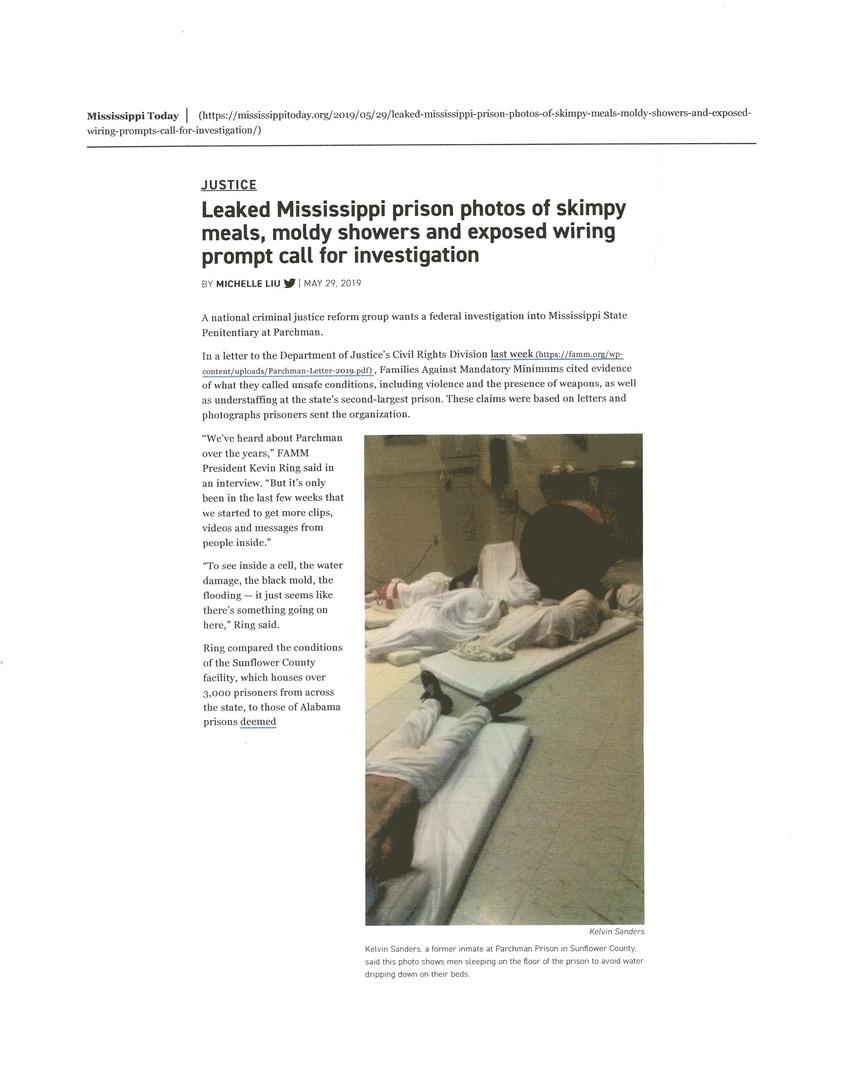

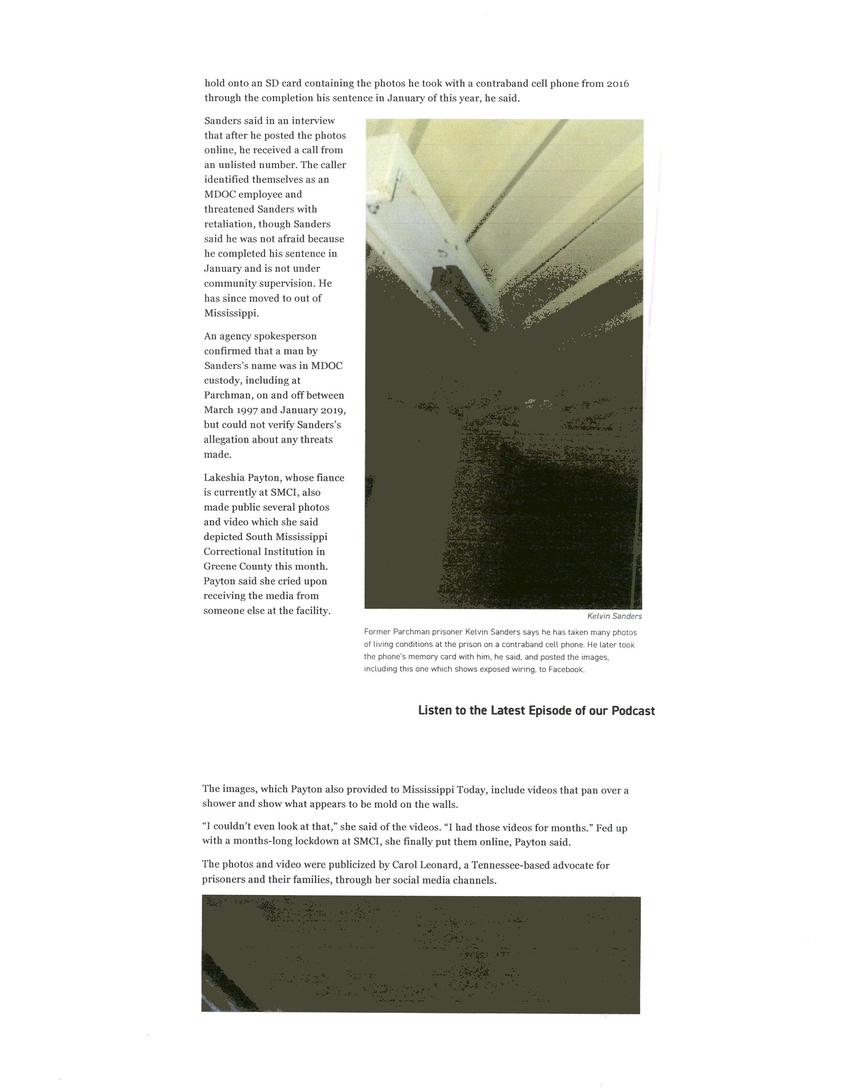


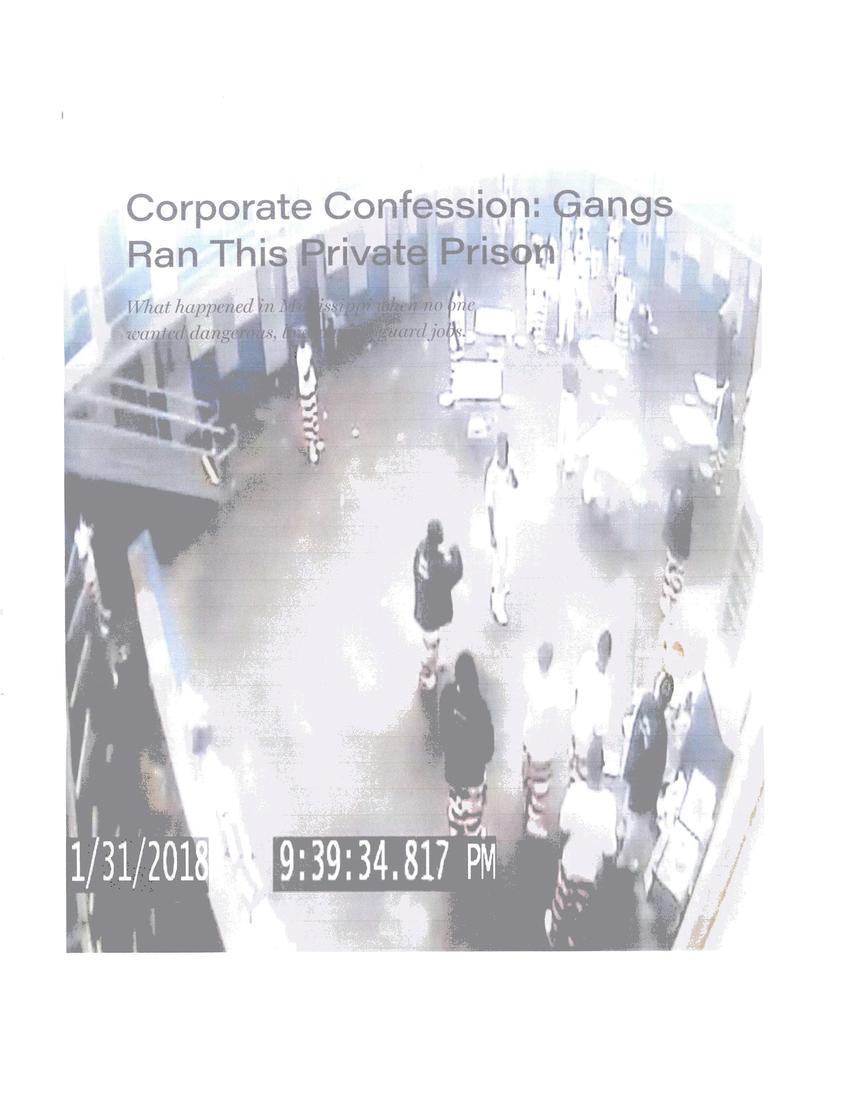
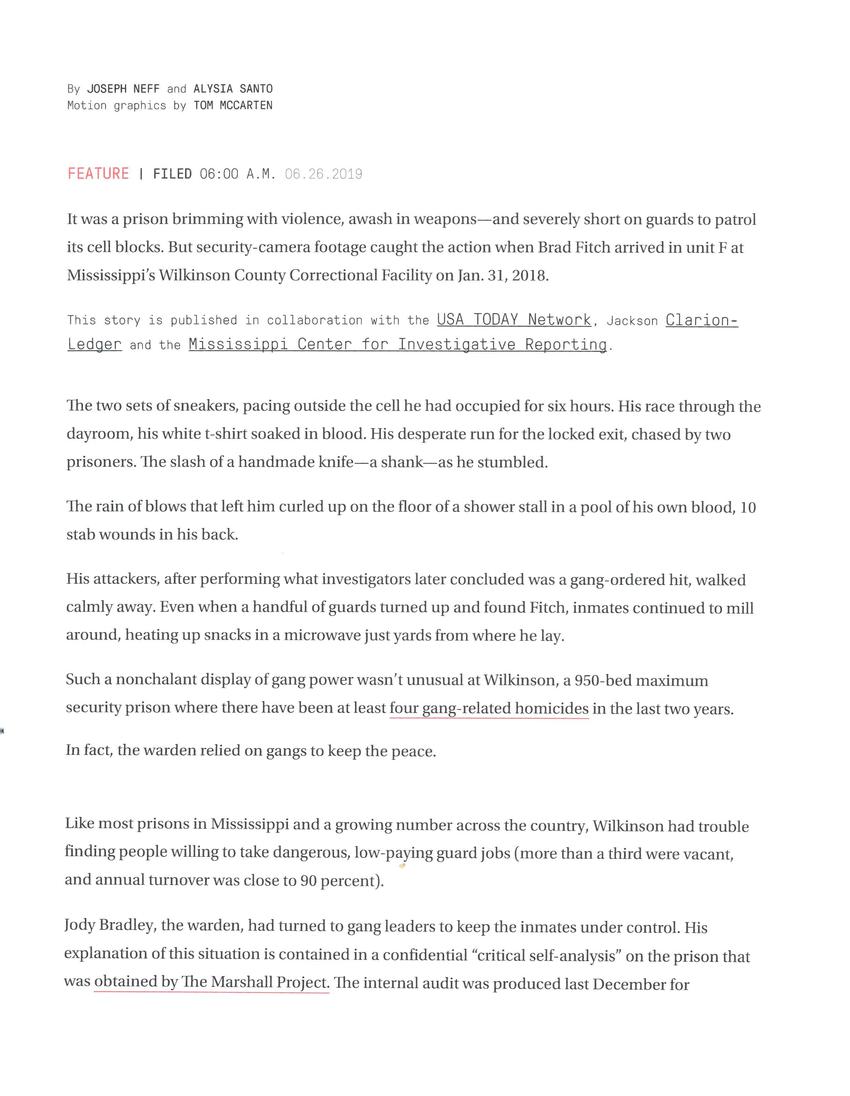
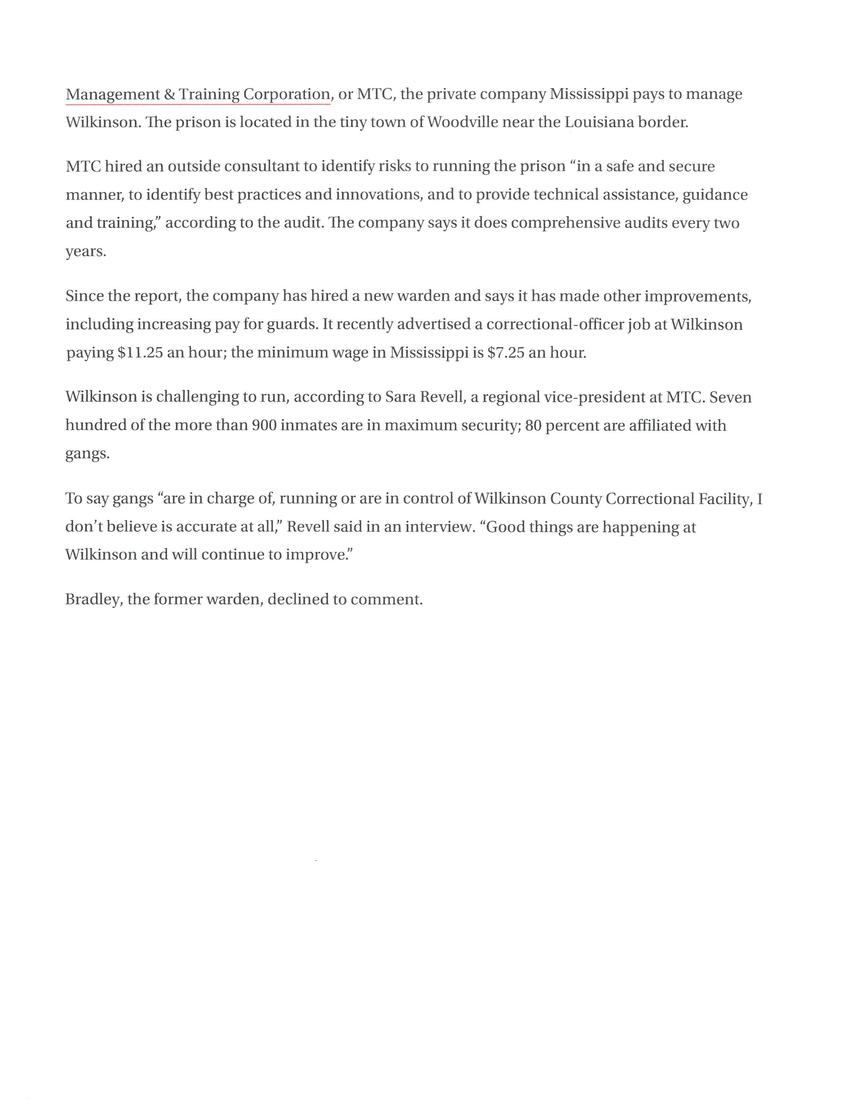
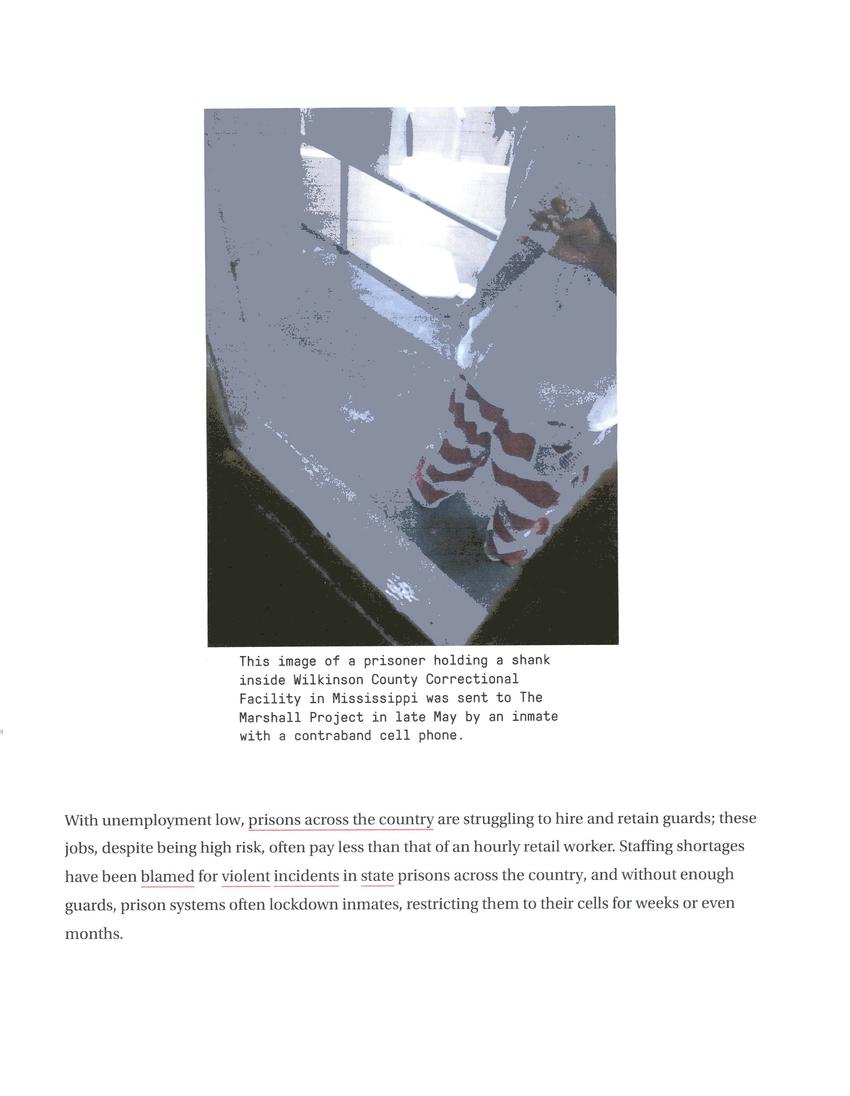
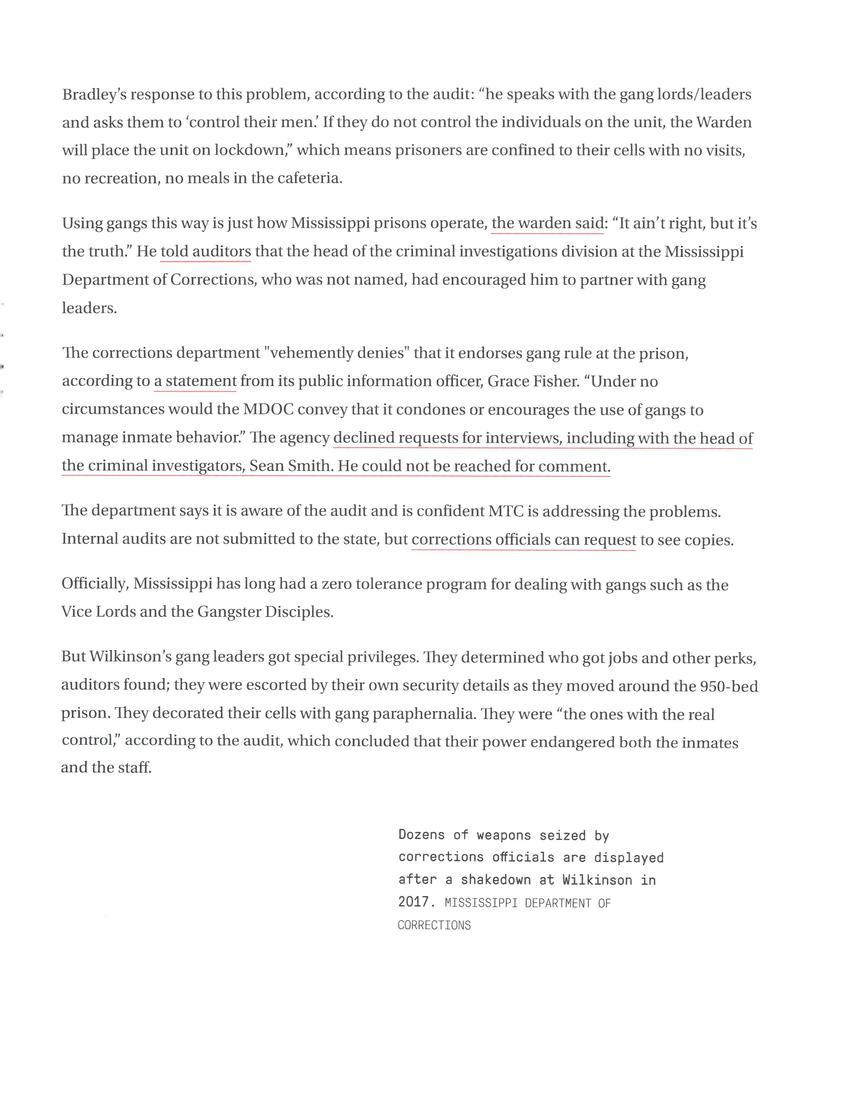
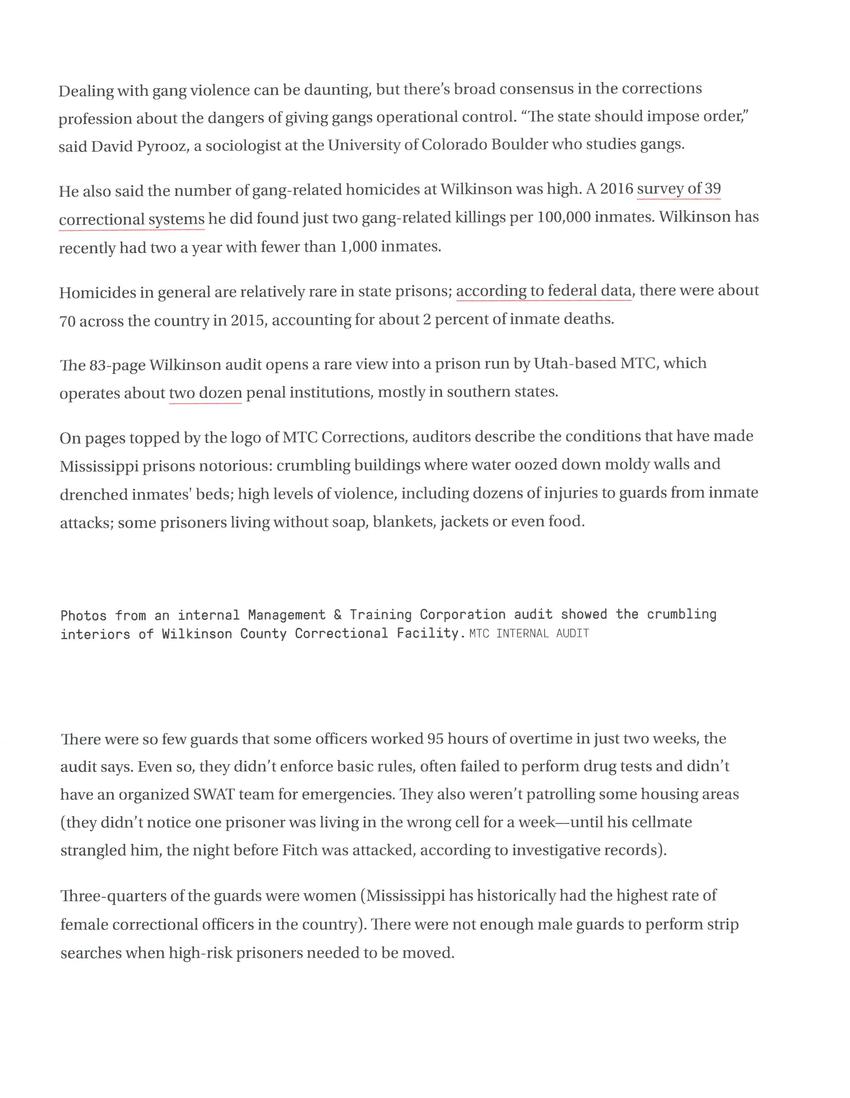
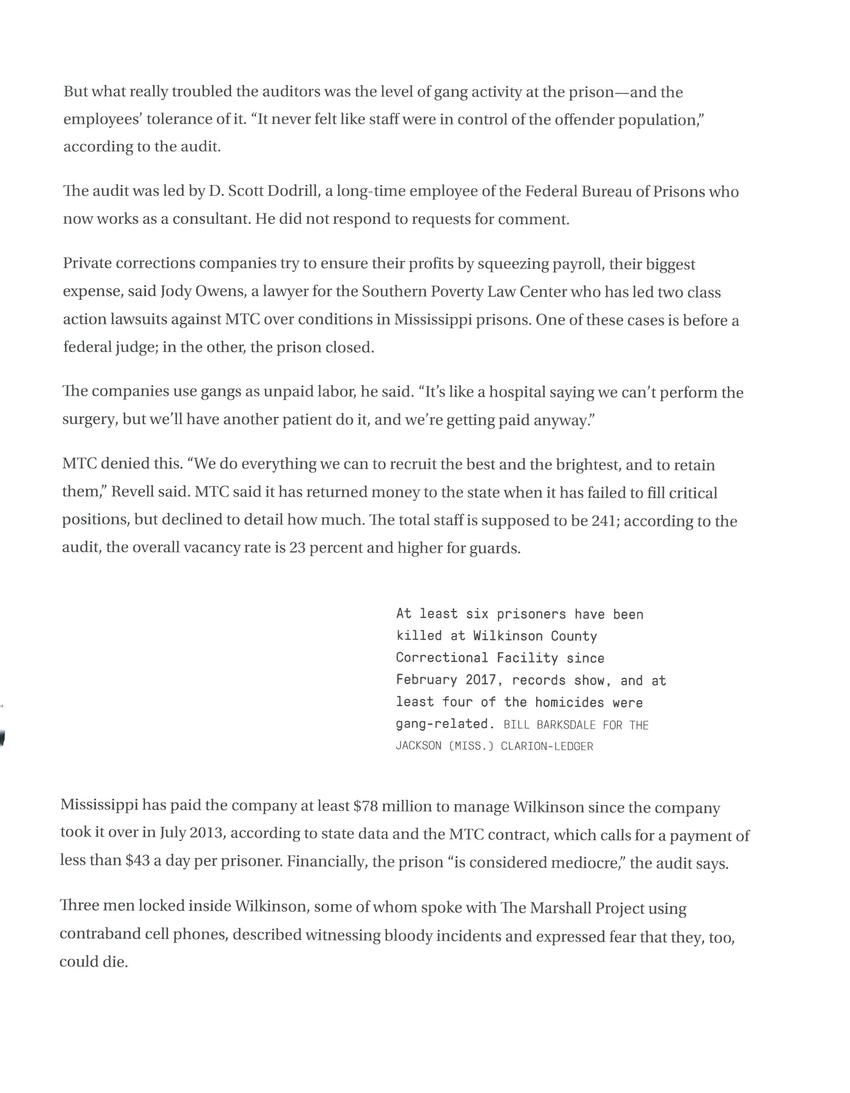
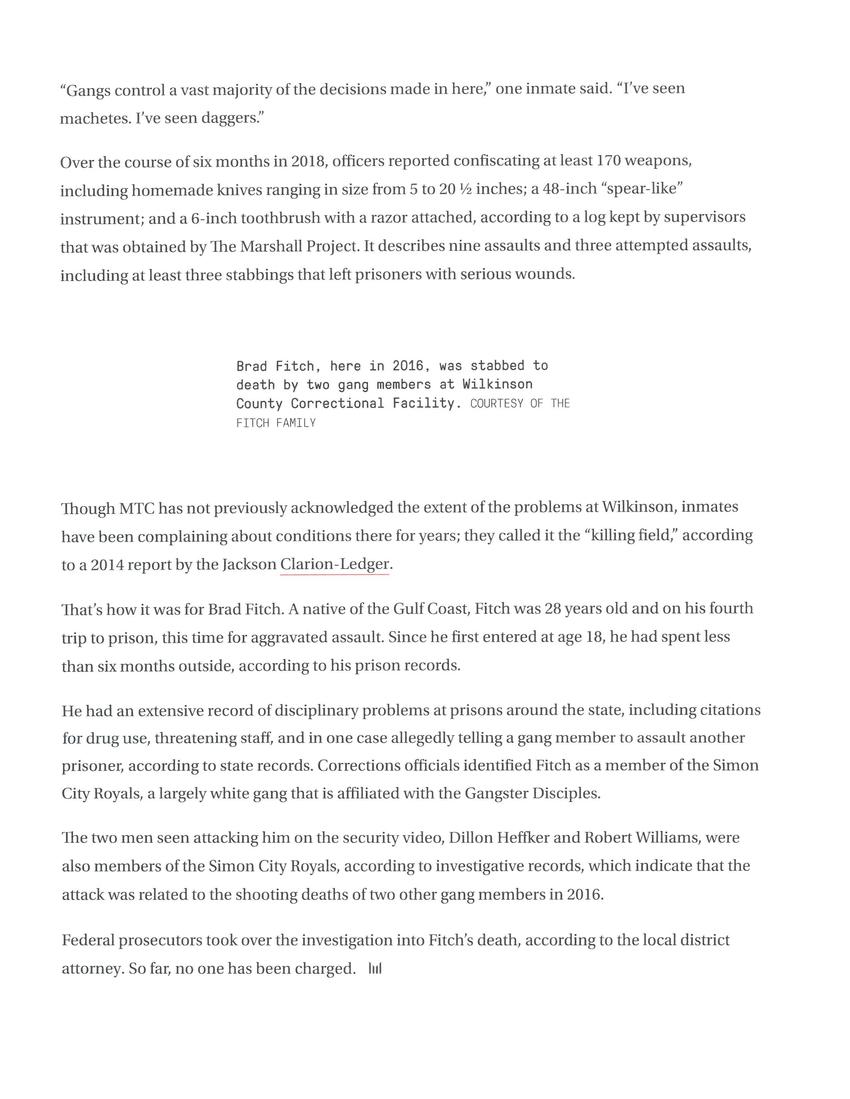
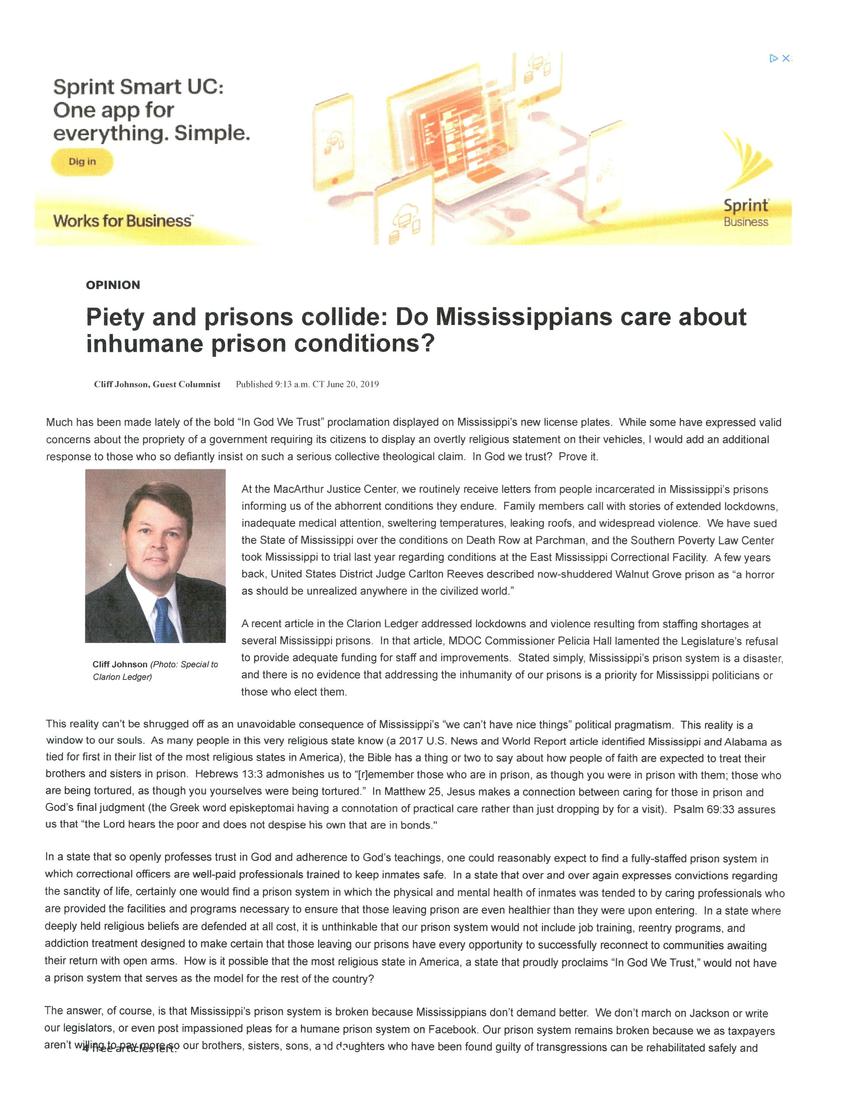
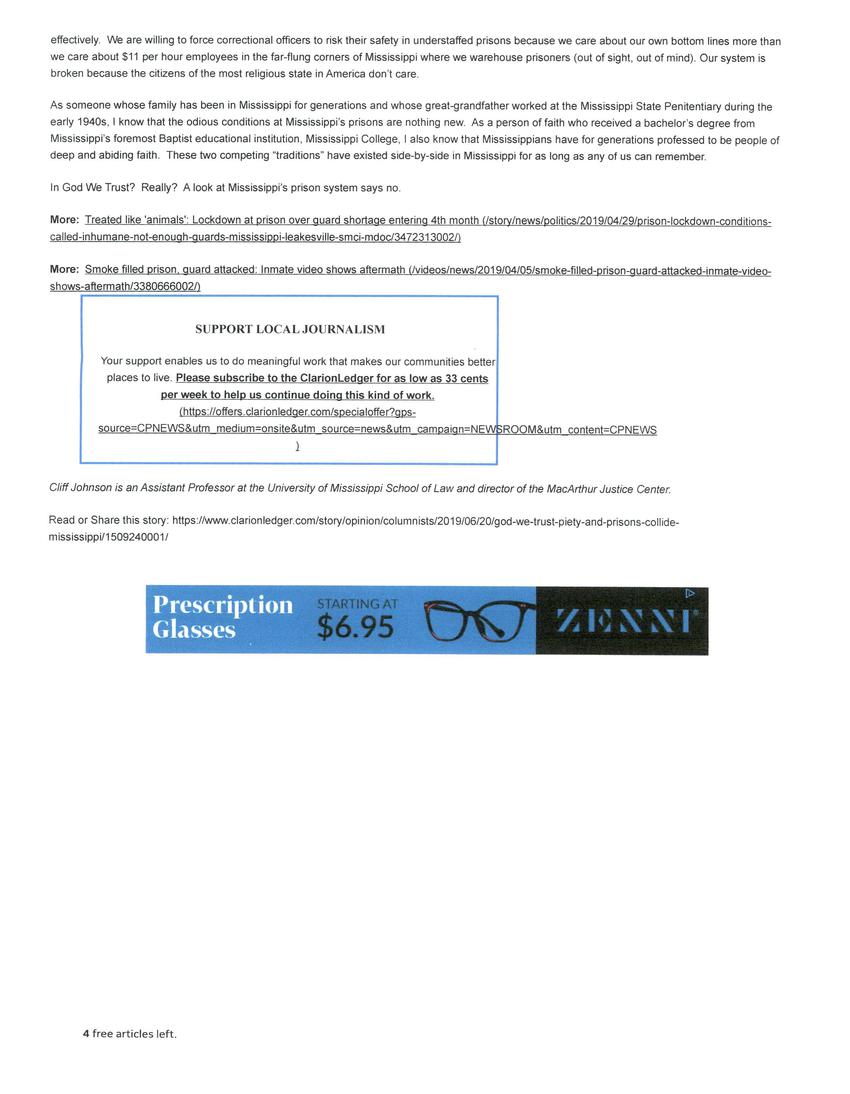

Replies